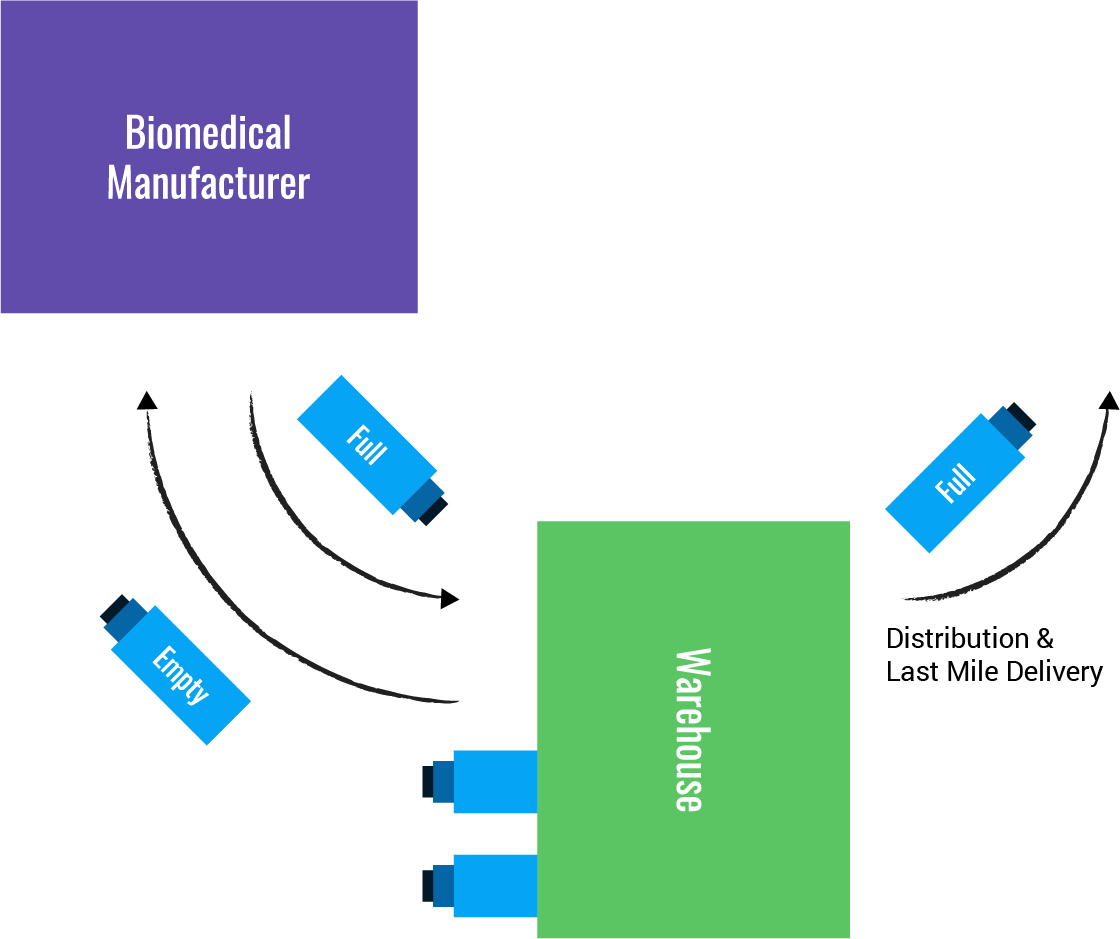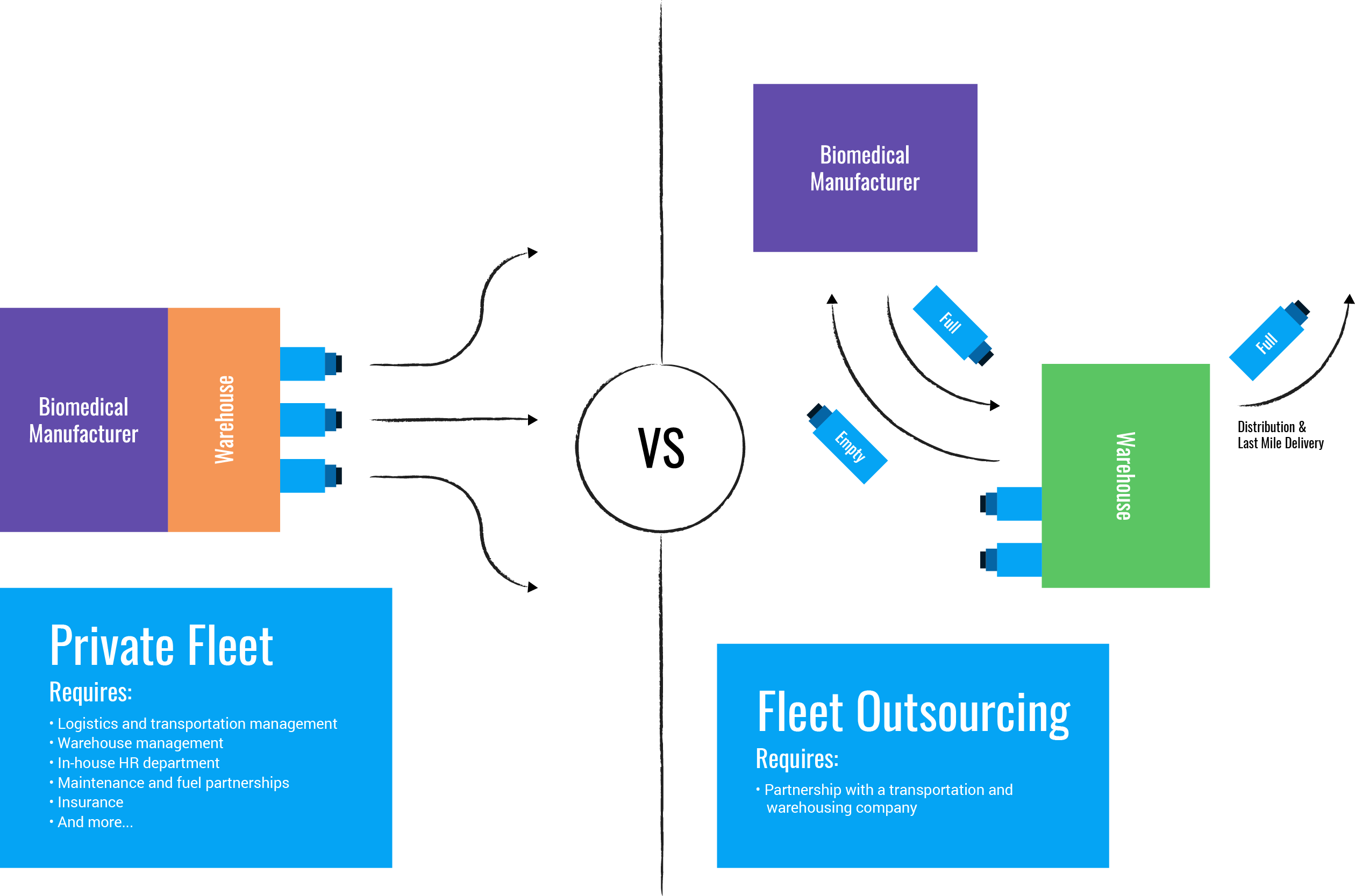Fleet outsourcing vs. private fleets: everything you need to know
Fleet Outsourcing vs. Private Fleets: Everything You Need to Know
These days, there are so many variables in the world of transportation:
Between the cost to own and operate a fleet, an increasing demand for expedited delivery at competitive prices, sweeping technological innovation, and the industry’s dreaded driver shortage, it can be challenging for shippers and manufacturers of any size to choose how to transport their products.
On the one hand, shippers can retain complete control of their supply chain and transportation operations by operating a private fleet.
But this option can come at staggering costs—as many carriers pour seemingly endless resources into an arm of their business that’s far from embodying the company’s core competency.
Because of the sheer quantity of variables and confusion around whether fleets should be kept in-house or outsourced, we decided to put together a comprehensive guide that gives you all of the information you need in order to make an educated decision.
Read on to become a fleet outsourcing and private fleet expert!
Operating a Private fleet
Before we get into the definition of fleet outsourcing, it’s important to understand the flip-side of the coin: in-house or private fleets, and why they exist.

What is a private fleet?
At the most basic level, companies that manufacture products or harvest materials need a way to get them to end users safely and reliably.
Many of these companies produce enough to warrant putting some thought into the pros and cons of in-house or private distribution.
If a company decides to become a private carrier—operating an in-house fleet that moves the consumer goods, raw materials or industrial products that it produces to its consumers—it needs to master most (if not all) aspects of the supply chain. This includes logistics, fleet management and maintenance, and of course, transportation.
Not to mention, companies operating in-house fleets often keep the human resources piece—recruiting, onboarding and managing drivers—in house.
Because of the complexities of running an in-house fleet, many private carriers deviate from the core competencies of their business in order to keep the distribution and last mile delivery of their products in-house. These carriers effectively run small trucking or courier companies in addition to running their own business.
As taxing and complex as it may seem, many companies that need to move what they produce choose to operate in-house fleets. According to the ATA, 53.3% of all carriers are private carriers, for a total in the United States of about 620,000.
So why do just over half of the carriers in the United States operate private fleets?
Let’s explore some benefits to keeping things in-house:
The advantages of a private fleet
Like just about anything in the world of business, the choice between a dedicated fleet and a private fleet is not cut and dry, and often depends on the size, nature, and philosophy of the business in question.
Some companies swear by their private fleet, and can trace numerous business benefits back to their decision to keep their transportation and logistics operations internal.
Let’s check out the major benefits cited by private carriers and fleet managers:
Guaranteed capacity at all times
Some companies that consider outsourcing to other carriers are wary of the possibility that capacity could become an issue down the road.
If a transportation partner’s fleet is tied up, and can’t meet the demand posed by the shipper, things can go downhill fast, as many consumers could end up empty-handed or dissatisfied with the speed or quality of their service.
More direct impact on customer service
Private fleets often recruit and train their own drivers—and even if these drivers are contracted on a project-to-project basis, there are fewer degrees of separation between a private carrier’s human resources apparatus and the drivers.
This allows private carriers to imbue their drivers with the company philosophy, from customer service standards to safety practices and expectations.
The ability to design a custom fleet
Generally, if a carrier decides to go private, the company has the ability to shape the fleet to meet current demand with an eye toward the future.
It comes back to the same concept of guaranteed capacity. Not all dedicated fleets can guarantee that vehicle and driver availability will scale along with the growth of the company they serve.
For example:
Let’s say Company A manufactures biomedical equipment and has decided to form and operate a private fleet. Most of its business is currently local, so at this time, the fleet is composed of five refrigerated sprinters for short distances.
If the company projects regional or national growth in the next two years, it may want to think about investing in larger refrigerated dock trucks for longer distances.
Having a private fleet can offer a greater level of flexibility to do this if local dedicated carriers are not equipped with the fleets or manpower to scale.
Advertising and brand recognition
One of the clearest benefits of a private fleet is the ability to create brand recognition through advertising. Being able to adorn a truck or van with the company logo and other media is crucial for some carriers that want to grow through word of mouth and advertising.
Flexibility
Scheduling flexibility is another possible benefit inherent in the choice to operate a private fleet. Have an unexpected shipment that needs to go out in the next twenty minutes?
Not all dedicated fleets are equipped to handle high levels of variance when it comes to the timing of shipments.
The disadvantages of operating a private fleet
While running a private fleet comes with its share of potential benefits, there are significant drawbacks that motivate a large chunk of shippers to seek outside help.
Higher Cost
Cost is by far the most significant factor motivating shippers to gravitate to common carriers and dedicated fleets. It also tends to be a piece of the problem when it comes to just about every other disadvantage shown below.
At the most basic level, companies operating private fleets are responsible for purchasing, fueling, and often maintaining their own fleets.
But that’s really just the tip of the iceberg.
The implementation of a private fleet requires an entire logistics apparatus, responsible for scheduling, routing and technology implementation. Combine this with the cost of insurance, driver recruitment and driver wages, and you have a bill capable of crippling a company.
Maintenance
Maintenance and upkeep go hand in hand with the ownership of delivery vehicles.
Not only does this incur significant costs, but it also takes time to approve and complete, keeping trucks off the road and decreasing efficiency.
Logistics and technology
Quality logistics technology is expensive and requires time and training to implement. Operators of private fleets need to ensure that they choose the right methods and technologies to keep their end users happy.
Driver recruitment
While neither private fleets nor common carriers are immune to the driver shortage that has taken over the transportation industry, common carriers have the reputation and infrastructure in place to recruit, manage and retain drivers.
Private fleets, on the other hand, need to develop an entire human resources apparatus around attracting and retaining drivers—if they hope to be competitive. Common carriers often have multiple staff members fully dedicated to this objective.
A corporate HR team will have a steep learning curve, at the very least.
Regulatory Compliance
The transportation and logistics field has been the subject of a great deal of regulation in the past decade. These regulations have affected core elements of the industry, from the number of consecutive hours a driver can operate a commercial vehicle to the types of tracking technology used.
Dedicated contract carriers are well-equipped to adhere to these regulations, while newly formed private fleets may see them as yet another inconvenient (and potentially costly) hurdle.
Fleet Outsourcing Services and Dedicated Fleet Carriers
We’ve discussed some benefits and drawbacks of operating a private fleet, but how does it all stack up against fleet outsourcing, and how can a company make an educated decision on which method it should choose?
Let’s explore the concept of fleet outsourcing as well as its benefits and variations.

What is fleet outsourcing?
The fleet management market is currently worth about $13.78 billion and is projected to hit $28.66 billion by 2022. That’s a Compound Annual Growth Rate (CAGR) of 15.8%.
So what’s driving this growth?
Well, in short, shippers are seeing the benefits of outsourcing, and they’re realizing that although they can, they don’t need to outsource every single aspect of their transportation and logistics process.
In fact there are four major types of fleet outsourcing:
1. Leasing equipment
Fleet outsourcing is not always an all-or-nothing endeavor.
In fact, many private carriers that want to reap the potential customer service, advertising, and guaranteed capacity benefits of running fleet operations in-house opt to lease vehicles and equipment rather than purchasing.
There are plenty of companies in the United States and overseas that offer a variety of makes and models to fit a carrier’s needs. Many of these companies also take care of the administrative side, and some even provide maintenance for a monthly cost.
The benefits of leasing are quite clear for carriers that prefer a largely fixed monthly expense that allows greater access to capital rather than outright ownership of a fleet of depreciating assets.
The drawbacks of leasing will often depend on the needs of the carrier and the pricing provided by companies in their area. In some cases—similar to the purchase of a personal vehicle—leasing may not be cost-effective.
Leasing also fails to make a private carrier’s fleet management, logistics and human resources responsibilities any easier, as the private carrier will still be responsible for operating these processes internally.
2. Outsourcing human resources operations and driver recruitment
If a private fleet operator decides that the driver shortage is too big of a hurdle to tackle internally, it can outsource driver recruitment to a workforce solutions provider (WSP).
If a private carriers choose to go in this direction, it will maintain control of every aspect of its in-house fleet—but will no longer be responsible for operating an in-house HR apparatus.
In fact, most WSPs take care of the majority of the human resources work related to hiring, payroll, and recruiting. The WSP is also liable for most employer related liabilities such as workers compensation, and employee-related lawsuits.
WSPs are also beneficial when it comes to dealing with compliance and regulations. They provide employee training and development in these areas.
Working with a WSP is beneficial to private fleet operators who want to avoid the headache of recruiting and onboarding drivers. It can also alleviate compliance and liability-related headaches.
Once again, the overall benefit of outsourcing to a WSP depends on the reasons a fleet was kept private in the first place. If a private fleet operator values guaranteed capacity and the advertising benefits of an in-house fleet above its other benefits, then working with a WSP may make sense.
3. Outsourcing human resources and equipment from different companies
Renting vehicles and working with a WSP doesn’t have to be an either-or proposition.
Some companies choose to outsource equipment as well as the HR and administrative functions related to driver recruitment and onboarding.
In these cases, carriers retain control of their supply chain and logistics operations.
4. Working with a dedicated contract carrier to fulfill all transportation and logistics needs
Working with a dedicated contract carrier (DCC) is the most comprehensive fleet outsourcing solution a carrier can pursue.
In fact:
Many of the benefits cited for operating a private fleet are the same—and often achieved more successfully—with a dedicated fleet.
Let’s explore some of these:
1. DCCs take care of a shipper’s transportation-related HR needs
Dedicated contract carriers take care of all HR-related tasks, from reliable driver recruitment to hiring, training and onboarding. They also assume drivers to their own payroll, so that carriers don’t have to worry about setting up these processes internally.
In addition, DCCs are always on top of new regulations and legislation slated to affect the transportation and logistics industry—including hours of service and ELD. This also helps to minimize audit risks.
2. DCCs provide a custom fleet and take care of fueling and maintenance
At the most basic level, working with a dedicated contract carrier means that shippers don’t need to purchase their own vehicles and equipment.
While many private fleet operators cite guaranteed capacity as a big reason for staying in-house, guaranteed capacity is just as achievable when a shipper works with a dedicated contract carrier.
DCCs also take care of fueling and maintenance, saving shippers time and money.
3. DCCs often provide all the marketing benefits of operating a private fleet
Not all dedicated contract carriers “whitelabel” their vehicles and trailers. But for shippers concerned about losing out on the opportunity for moving billboards, some DCCs can adorn their vehicles and uniforms with logos in order to maximize brand interactions through the last mile.
4. DCCs have access to more advanced technology
Dedicated contract carriers operate in the transportation and logistics industry for a living. So naturally, they make significant investments in the best possible fleet management and routing optimization technology.
DCC’s also use this technology to track fleet and driver productivity, enabling them to make changes and optimize routes. This proactive utilization of technology can cut costs and increase on-time delivery percentages.
5. DCCs are designed to provide exceptional customer service and on-time delivery
Once again, transportation and logistics are the core competency of any dedicated contract carrier. DCCs also know that in order to survive in a competitive industry, they need to provide exceptional customer service.
This means that all processes, from route mapping to driver onboarding, are designed to provide the highest possible level of service to the end user. DCCs are well-equipped to provide great service in the form of on-time delivery because of their vast experience, and their effective use of industry-leading technology.
6. DCCs have resources and partnerships that help to dramatically cut costs
One of the biggest benefits of working with a dedicated contract carrier is cost savings.
DCCs inherently have more purchasing power because they can leverage relationships with manufacturers, fuel suppliers, and insurance companies. Not to mention, transportation and logistics is their core competency, so they operate more efficiently and use technology that increases their level of service while cutting costs.
DCCs also offer a much higher level of flexibility than private fleets, even though private fleet operators often cite flexibility as a reason for keeping operations in-house.
Why?
Because DCCs can choose from a wider pool of drivers and have a larger selection of vehicles than private fleets. If a shipper’s business needs are subject to change, what happens when half of its vehicles are not being used, or when there is an immediate need for a different type of equipment that a private operator does not possess?
Fleet Outsourcing Viability Comes Down To Business Needs
No two businesses are exactly the same. The right choice between an outsourced, partially outsourced or private fleet should differ from business to businesses based on needs, preferences and company culture.
At face value, it’s difficult to rationalize a small or mid-sized shipper choosing to keep logistics and delivery in-house when it could cut costs and have constant access to the perfect supply for its demand by outsourcing its transportation needs.
Even so, if the benefits of operating a private fleet are enough in a company’s mind to rationalize its costs, along with the manpower needed to operate and staff it appropriately—it can be worthwhile for that business.
The decision to outsource or go private with your fleet depends on a variety of factors, ranging from liquidity needs to business size and growth objectives.
Perhaps the most underrated of these factors is the ability to run the core business side-by-side with the transportation and logistics business, without a hitch. A private fleet can only be beneficial if its formation and operation don’t take away from a business’ ability to thrive.
If the operation of a private fleet relies on manpower or financial resources necessary for the survival and growth of the core business, it’s not a viable strategy.

What Are Your Company’s Business Needs?
Today, you’ve learned all about the benefits and drawbacks associated with a private fleet operation, along with the key ways in which fleet outsourcing helps businesses cut costs and increase efficiency.
Now it’s your turn to evaluate the best solution for your business based on your company’s needs, values and growth plans.
When considering whether to operate a private fleet or outsource some if not all transportation and logistics needs to a dedicated common carrier, consider the following questions:
1) Will operating a private fleet distract or hinder the operations of my core business?
2) When all variables are taken into account, including physical equipment, human capital, and industry knowledge, what is the value proposition for keeping each aspect in-house versus outsourcing?
3) Why do I want to manage a private fleet? Can these goals be met in a more cost-effective manner through fleet outsourcing?
At Winnesota, we find that many of the benefits cited for operating a private fleet are the same—and often achieved more successfully—with a dedicated fleet, or even with partially outsourced fleet management.
If you come to the same conclusion, we’re happy to help you find the perfect supply for any demand with fleet management and outsourcing.
